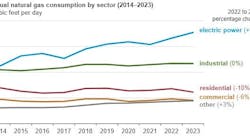Eric Watkins
OGJ Oil Diplomacy Editor
LOS ANGELES, Feb. 25 -- A combination of bad weather and continued violence are said to have brought Libya’s ports to a virtual standstill, reducing the country’s already hard-hit oil and gas exports to a mere trickle, if anything at all.
The violent uprising against Libya’s leader Moammar Gadhafi has deterred some shippers even from sailing to Libya, while other ships are turning back or simply refusing to enter at Libyan ports.
“It is a combination of disruptions and bad weather,” said one oil trader, while other sources claimed that key Libyan oil and oil product terminals to the east of Tripoli are held by rebels.
According to the International Energy Agency, eastern Libya is home to five of Libya’s six major oil export terminals, which sent 958,000 b/d, or 60% of the country’s crude to market in January.
Some sources claimed that large areas barely 50 km east of Tripoli are now under rebel supervision including Benghazi, a city that lies to the north of Libya's main oil and gas region.
Some residents of Benghazi told Reuters news agency that the oil and product terminals at Ras Lanuf and Marsa El Brega were being "protected" by rebel forces.
Ras Lanuf is 600 km east of Tripoli and loads oil and products. Marsa El Brega is used for oil and products.
Soliman Karim, a resident involved with helping administer Benghazi, said, “Exports are going on as usual, the same amount as have been agreed before.”
Karim told Reuters, "The revolutionaries are protecting these areas because they are vital areas. We don't want them sabotaged and we don't want them to stop exporting oil.”
Another resident of Benghazi said Ras Lanuf and Marsa el Brega were in the hands of the rebels, but he suggested there may have been some impact on flows.
Reuters said the reports could not be independently verified, a point underlined by one shipping source who said, “You can't get into those ports. There is zero communication.”
Analyst Stratfor said, “It is still very early in the conflict, and there is no indication that anti-Gaddafi forces are consolidating in eastern Libya.”
But the analyst conceded that control of the Gulf of Sidra could provide “crucial strategic depth” to a region of Libya that appears to be breaking away from the control of central government in Tripoli.
“The Gulf of Sidra is critical to Libya’s energy exports,” Stratfor said, noting that the ports of As Sidra, Marsa el Brega, Ras Lanuf, Tobruk, and Zuetina handle 77% of Libya’s oil exports.
“Allegiances in the Gulf of Sidra and the economic value they represent, therefore, are key to the survival of Gaddafi’s regime,” the analyst said.
Meanwhile, in an effort to allay international concerns over real and imagined disruptions to oil supplies, international organizations have weighed in with reassurances.
The IEA said it "stands ready, as always, to make oil available to the market in the event of a major supply disruption if alternative supplies cannot readily be made available via normal market mechanisms."
The Organization of Petroleum Exporting Countries is ready to ensure adequate supplies, according to Ali I. Al-Naimi, oil minister of Saudi Arabia, which alone has 4 million b/d of spare capacity.
"There is absolutely no shortage of supply now,” said Al-Naimi, who added that OPEC “and particularly Saudi Arabia” are ready to meet “any shortage in supply when it happens.”
That ability was underlined by Win Thin, global head of emerging markets strategy for Brown Bros. Harriman, who said, "Markets have always relied on Saudi Arabia to act as the swing producer, boosting output if supplies were disrupted elsewhere.”
Contact Eric Watkins at [email protected].

